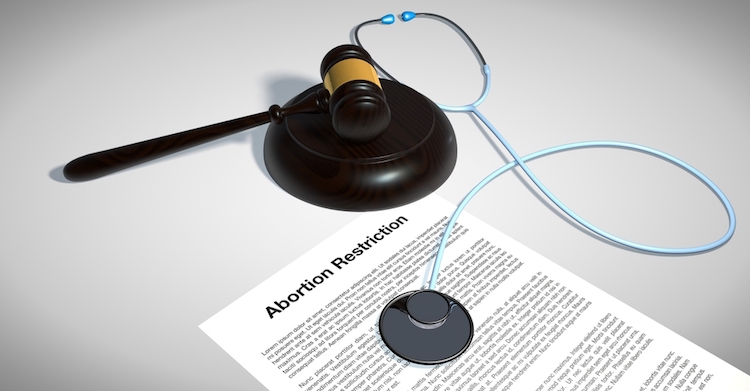Litigation over abortion bans begins at state level; judges block laws in 5 states

Image from Shutterstock.
Updated: Supporters of abortion rights are taking their battle to state courts after the U.S. Supreme Court overturned Roe v. Wade on Friday.
Some supporters argue that state constitutions protect the right to abortion, the Associated Press reports. Some argue that abortion restrictions are unclear. Some argue that lawmakers in 13 states who passed anti-abortion trigger laws—which were to take effect if Roe is struck down—can’t bind current lawmakers. Some argue that conditions have not been met for trigger laws to take effect.
Judges in Utah and Louisiana temporarily blocked abortion bans Monday, according to the AP, the New York Times and Reuters. A Texas state court on Tuesday blocked an abortion ban enacted before Roe, according to a statement by the American Civil Liberties Union. On Thursday, judges temporarily blocked Florida’s 15-week abortion ban and Kentucky’s conflicting abortion restrictions, according to the Washington Post and a press release.
“It’s all about the states from here on out,” said Jessie Hill, a professor at the Case Western Reserve University School of Law, in an interview with the New York Times. “We can fantasize about federal solutions to this issue or nationwide settlements of the abortion question, but I think that after Dobbs [v. Jackson Women’s Health Organization], I don’t see a lot of possibilities at the federal level.”
According to the New York Times, reproductive-rights supporters “are coalescing around a strategy of asking courts for temporary injunctions that at the very least can allow abortions to proceed in the short term.”
Lawsuit already filed include:
• In Louisiana, an abortion clinic and other plaintiffs argue that it’s unclear which of the state’s trigger laws are in effect and what conduct is banned. Orleans Parish Civil District Court Judge Robin Giarrusso granted a temporary restraining order in the case until a July 8 hearing on the TRO. The plaintiffs are represented by the Center for Reproductive Rights, Boies Schiller Flexner and local counsel Ellie Schilling. (The AP, Reuters, Law.com, Giarrusso’s order, Boies Schiller Flexner press release)
• Planned Parenthood Association of Utah filed a lawsuit claiming that the state’s trigger law violates the state constitution. Third District Judge Andrew Stone issued a temporary restraining order Monday that blocks the law for 14 days. Planned Parenthood Association of Utah is represented by the Planned Parenthood Federation of America, Zimmerman Booher and the American Civil Liberties Union of Utah. (The AP, the Washington Post, Planned Parenthood press releases here and here, the lawsuit)
• In South Carolina, U.S. District Judge Mary Geiger Lewis allowed a blocked South Carolina abortion law to take effect. The law bans abortions after a fetal heartbeat is detected. (The AP, South Carolina attorney general press release, the Lewis’ June 27 order)
• A lawsuit filed on behalf of Kentucky abortion clinics and a health care provider seeks to block a full abortion ban passed in 2019 and a six-week ban previously blocked by a federal court. The suit claims that the Kentucky Constitution protects the right to abortion. A Jefferson Circuit Court judge temporarily blocked both laws Thursday. (ACLU press releases here and here, the lawsuit, the judge’s June 30 restraining order)
• In Florida, a lawsuit alleges that a law that bans abortions after 15 weeks of pregnancy violates the state constitution. The suit was filed on behalf of abortion providers and health centers by the American Civil Liberties Union, the ACLU of Florida, the Center for Reproductive Rights, the Planned Parenthood Federation of America and Jenner & Block. A second lawsuit filed by a Jewish synagogue, Congregation L’Dor Va-Dor, makes a religious liberty argument. Judge John C. Cooper of Leon County, Florida, issued a temporary injunction Thursday. (The AP, Planned Parenthood press release, the Planned Parenthood lawsuit, the New York Times, the Washington Post)
• A lawsuit filed on behalf of abortion providers in Texas seeks to block an abortion ban passed before Roe. A judge temporarily blocked the ban Tuesday, which means that abortions up to six weeks of pregnancy are currently allowed in the state. The suit was filed by the Center for Reproductive Rights, the American Civil Liberties Union, the ACLU of Texas, Morrison & Foerster and Hayward. (ACLU press release, Reuters, the June 27 lawsuit)
• A lawsuit filed on behalf of abortion providers in Idaho contends that the state’s trigger law banning abortion violates Idahoans’ right to privacy and equal protection under the Idaho Constitution. (Planned Parenthood press release, the June 27 lawsuit)
• An abortion provider in Mississippi filed a lawsuit claiming that the state constitution protects a right to abortion. In support of the argument, the lawsuit cites a 1998 Mississippi Supreme Court decision, Pro-Choice Mississippi v. Fordice. (The Mississippi Free Press, WAPT, the June 27 lawsuit)
• The American Civil Liberties Union of Arizona and the Center for Reproductive Rights filed an emergency motion in an existing lawsuit over the state’s 15-week ban on abortion. The motion seeks to block a provision requiring the state to interpret laws to confer the rights of people on unborn children. (The AP)
• A lawsuit filed in Michigan before the Dobbs ruling alleged that a 1931 abortion ban violates the state constitution. A judge agreed with the argument in May. Gov. Gretchen Whitmer said she is also filing suit to block the law. (The AP, NPR)
• The Iowa Supreme Court ruled June 17 that the state constitution doesn’t protect a right to abortion. The court ruled in a challenge to a state law requiring a 24-hour wait before an abortion. (CNN)
Updated June 28 at 11:40 a.m. to report on the Texas ruling. Updated June 30 at 12:45 p.m. to report on rulings in Florida and Kentucky.
Write a letter to the editor, share a story tip or update, or report an error.


